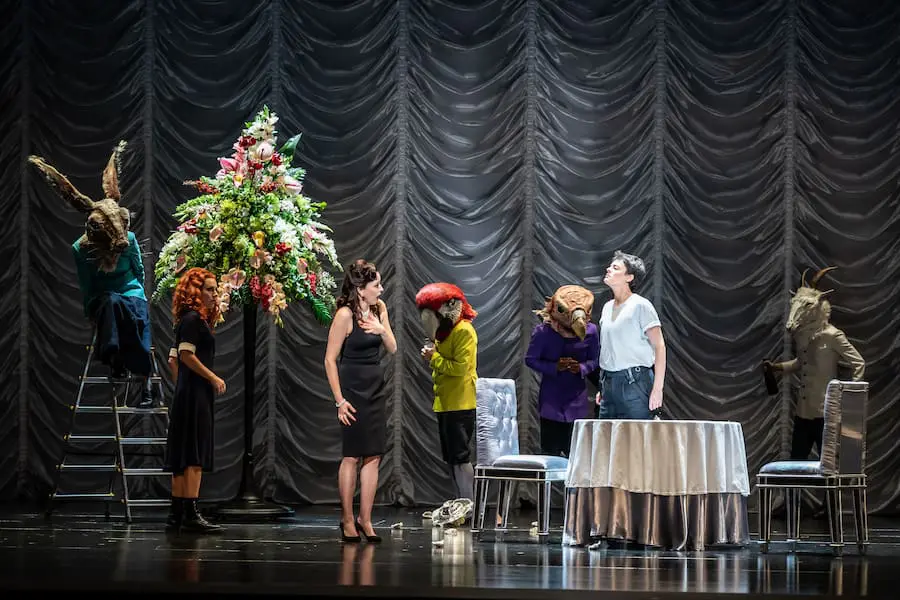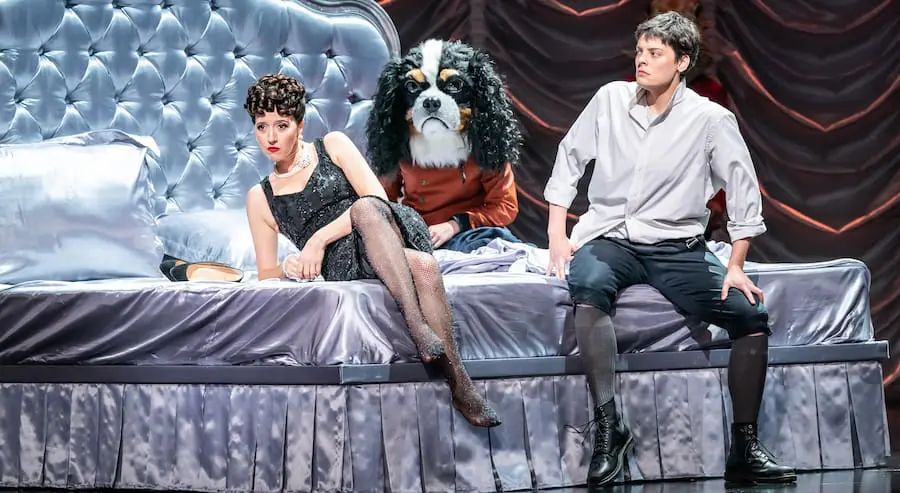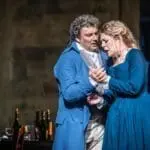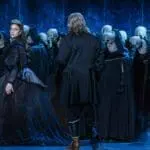Handel‘s 1735 opera Alcina is one of the most popular baroque operas in the repertoire and is featured somewhere around Europe or England every year, either in a festival or an opera house. The last decade has seen: Katie Mitchel‘s darkly satirical, Shades of Grey-inspired production at Aix en Provence in 2015; the raucous 2016 David Bösch version in Geneva, a revival of Robert Carsen‘s delightfully decadent 1999 version at the Paris Opera, Adrian Noble‘s classy Vienna Staatsoper, 2018 extravaganza and (I almost forgot) the dreary Damiano Michieletto version at the 2019 Whitsun Festival in Salzburg. All these productions benefited from the best baroque singers on the circuit and left little to desire from the musical side (with the likes of Mark Minkowski, Thomas Hengelbrock, or Leonardo Garćia Alarćon in the pit). However, none combined the joy, humor, and vocal exuberance like this year’s Royal Opera House, end-of-the-year production by Richard Jones and conductor Christian Curnyn. And what better enchantress than Cuban American soprano Lisette Oropesa to play the title role, luring lovers to her island before transforming them into animals and birds with a spritz of her ‘Alcina’ perfume? (Contained in a giant Guerlain-style flacon, replacing Alcina’s magic urn.)
Designer Antony McDonald imagines Alcina’s realm as a glamorous mixture of Gucci and Dolce & Gabbana-style campaigns. The central set is her velour-padded bedroom, where her team of adorable ‘pets’ with oversized heads (the King Charles spaniel is my favorite) gather on the silk duvet cover. Once members of a puritanical community, they are corrupted by Alcina’s decadent ways without much apparent resistance.
Her latest lover is Ruggiero, sung by Emily D’Angelo. And just a word for those purists who feel this role should be cast with a countertenor—you might have a second take when you see and hear the Canadian star mezzo. The truth is few singers, whether countertenors or mezzos, have this depth of tone, range, and stylistic perfection or play the role this convincingly, for that matter. Her art is unequaled in “Verdi Prati.”

MARY BEVAN as Morgana, LISETTE OROPESA as Alcina, EMILY D’ANGELO as Ruggiero © Marc Brenner
To save her husband from Alcina’s grips, Bradamante, the splendid Varduhi Abrahamyan, disguises herself as her own brother, Ricciardo. Then, together with the puritan bible- brandishing elder, Atlante, disguised as ‘Melisso,’ a sailor, they travel to Alcina’s island, and thus the opera begins.
The two are greeted by Alcina’s sister Morgana (excellent Mary Bevan), who is immediately attracted to ‘Ricciardo.’ They then encounter Oberto, a lost boy searching for his father, whom they suspect has fallen prey to Alcina. When hearing the young Malakai M Bayoh in this role, one is dumbstruck by his ease in three challenging arias, as well as his energy and captivating stage presence.
Despite nerves that hinder her for part of the first act right up to the much-awaited “Tornami a vagheggiar,” which lacked precision in the coloratura, Bevan gained confidence in the second, showing to the fullest the artistry and bravura she is capable of.
Oropesa, on the other hand, casts her spell from her first aria, ‘Di’, cor mio, quanto t’amai’ with her distinctive timbre and disarming technical ease. Ruggiero is wholly smitten and, with only a dim memory of Bradamante, scorns her in the aria ‘Di te mi rido.’ (I’m laughing at you) Varduhi Abrahamyan infuses Bradamante’s arias with brooding undertones and beautiful burnished colors that portray her suffering. Then it’s Morgana’s jealous fiancé, Oronte’s turn to torment Ruggiero “Semplicetto. A donna credi?” (Simpleton. Would you believe a woman?) into thinking that Alcina is in love with ‘Ricciardo.’ English tenor Rupert Charlesworth has a great deal of presence and a beautiful voice as Oronte, each one of his scenes is a delight, and he’s also the rebel who refuses to be converted to puritanism.
In Act II, when Melisso reveals himself as Atlante, Ruggiero’s memory is jogged, and his love for Bradamante is reawakened. When he attempts to escape the island, Alcina tries to prevent him with a spell, but her powers have abandoned her. All approach the urn— the giant Alcina Perfume bottle—that protects her magical powers. With Bradamante, Atlante, Oronte, and the animals beside him, Ruggiero smashes it. The island’s enchanted creatures – including Oberto’s father – are restored to human form.
From beginning to end of this clever and wistful production, there is a contest between the sacred puritan notion of love and Alcina’s decadent world. But just as it seems the puritans have won; the broken urn is replaced by a huge cover image of Alex Comfort’s 1972 bestseller The Joy of Sex. It’s the punchline that brings the house down.
Related content ⬇
Opera Canada depends on the generous contributions of its supporters to bring readers outstanding, in-depth coverage of opera in Canada and beyond. Please consider subscribing or donating today.















